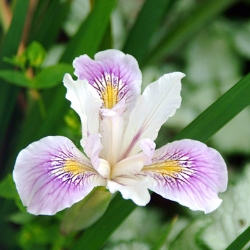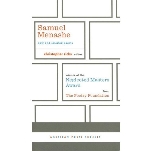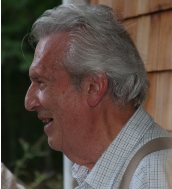
|
Deborah P. Kolodji is the president of the Science Fiction Poetry Association and a member of the Haiku Society of America. She edits Amaze: The Cinquain Journal and has published four chapbooks of poetry.
Samuel Menashe (1925 - ) was born in New York City, the son of Russian-Jewish immigrant parents. He grew up in Queens, and graduated from Queens College. In 1944, he served in the US army infantry in the Battle of the Bulge in the Ardennes. After the war, he used his GI Bill money to study at the Sorbonne where he received an advanced degree. In the 1950s, Menashe returned to New York, where he has lived the rest of his life. In 1961, he published his first book, No Jerusalem But This. In 2004, Poetry magazine in Chicago awarded Menashe its first Neglected Masters award, which resulted in Samuel Menashe: New and Selected Poems being published on the poet's 80th birthday. |
Spring 2007 Table of Contents - Vol. III, No. 1 |
|
|
Poetry Translations Interview Essays Fiction Book Notes & Reviews |
|
|
Samuel Menashe,
New and Selected Poems,
Christopher Ricks, editor. American Poets Project, The Library of America, 2005, ISBN 1931082855, hardback, 200 pp., $20.00. In 2002, pharmaceutical heiress Ruth Lilly donated part of her fortune to Poetry magazine, to the tune of $100 million dollars. As a result, the Poetry Foundation has become very busy creating prizes and awards to disperse some of this windfall. Out of this process came the Pegasus Awards, a family of prizes intended to create new awards for under-recognized poets and under-recognized types of poetry. One of the Pegasus Awards is the Neglected Masters Award, a $50,000 cash prize designed to bring renewed critical attention of the work of an under-recognized, significant American Poet. In 2004, the first Neglected Masters Award was given to Samuel Menashe. In October 2005, the Library of America published Samuel Menashe: New and Selected Poems in conjunction with this prize. Who is Samuel Menashe, and what makes him a Neglected Master? First, and foremost, Samuel Menashe writes very, very short poetry. In a review of Menashe’s New and Selected Poems in the literary webzine, Small Spiral Notebook, Laura McCullough writes, “the poems are so brief, they are like comets across the night sky: if you don’t pay attention, you could miss them.”(1) There are reasons that contribute to Menashe’s relative obscurity. Despite publishing several books of poetry and work in prestigious literary magazines such as The New Yorker and The Partisan Review, Samuel Menashe has shunned the academic life and the usual business of poetry. He is reclusive and has preferred to live in the same small apartment in Greenwich Village where he has resided since 1956. He is often described as bohemian. Yet, Dana Gioia writes in the introduction to the premier issue of Tundra, a print journal devoted to short poetry edited by Michael Dylan Welch, that “. . . the major cause of his obscurity, I suspect, is strictly literary. Menashe has devoted his entire poetic career to perfecting the short poem – not the conventional short poem of 20–40 lines beloved of magazine editors, but the very short poem.”(2) Indeed, few of Menashe’s poems are more than 10 lines in length. Compounding the fact that he writes these very short poems, Menashe has refused to subscribe to any particular school of poetry. He writes too much in rhyme to be an imagist. His work is too imagistic to be formal. He doesn’t write haiku. So, Menashe is a poet without a poetry community to champion him. Instead, his supporters are a handful of literary critics here and there who have listened to his voice and liked what they heard. He has enjoyed no unified school of poetry or body of poets to boost him to the forefront. Therefore, it is likely that he might not have emerged from obscurity without the direct intervention of something like the Pegasus Award. There is a mathematical precision to Menashe’s poems. In a New York Times article, “A Shoe That Fits: A Bohemian Poet’s Life,” Julie Salamon quotes Menashe as saying, “You know, ‘poet’ means ‘maker’ in Greek. Sometimes I feel like someone working on an algebra problem, and you’re coming to the conclusion, and it has to be perfectly balanced.” (3) Yet, there is something beyond the balanced equation, a sense of something greater in his poems, only hinted at in the words on the page. Old Testament allusions from Menashe’s Jewish roots often help fill out the picture. In the 9-line poem “Adam Means Earth,” Menashe writes,
I am the man
A footnote at the end of the poem notes that “Adamah” means earth in Hebrew. Juxtaposition, a literary tool which has been used in poetry since time immemorial, becomes particularly important in very short poetry. In an article for Twentieth Century Literature, Barry Ahearn writes, “Menashe’s work exemplifies the associational and synthesizing power that Wordsworth and Frost deem central to poetry. He habitually juxtaposes and marries otherwise conflicting or diverse discursive categories.” (4) From Manashe’s poem, Winter: I am entrenchedAgainst the snow, Visor lowered To blunt its blow. Here, winter is juxtaposed against war, as the visor of the poem’s speaker is lowered in preparation for battle. The first two lines reflect upon the title, as the poet is entrenched against the snow to weather the winter. The second two lines seem to shift the focus to the word “against,” bringing an adversarial feel to the point which is reinforced by the visor and the blow of lines 3 and 4. There is a fifth and final line in this poem, a one-line stanza – “I am where I go” – in which the poet reflects upon both experiences. He is who he is, whether weathering a cold New York City winter or engaged in battle, he is where he goes. It is the fifth line that makes this poem move beyond the simple rhyme of the first four lines and makes the reader stop and contemplate both winter and war and man’s humanity in the midst of both. Samuel Menashe is indeed a Neglected Master, but hopefully wider appreciation of his work as showcased in the book Samuel Menashe: New and Selected Poems will rectify the oversight.
© Deborah P. Kolodji |
|
|
Poetry Translations Interview Essays Fiction Book Notes & Reviews |

